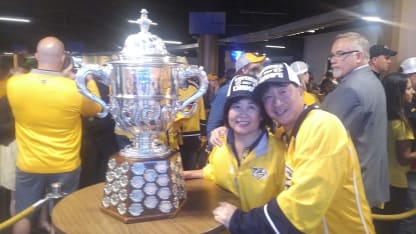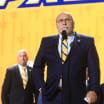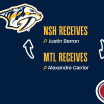Warren Woo was trying to figure out what was on his bucket list.
Back in the mid-2000s, Woo, the founder and managing member of Breakaway Capital Holdings, had been "basically retired" as an investment banker and wanted to try something new.
"It wasn't learning how to play an instrument or traveling the world or learning a new language, I love hockey," Woo said. "My thought was, 'How do I figure out a way to get more involved in some way with an NHL team?'"
Woo Proud to be Owner of Preds as NHL Celebrates Asian Heritage Month
Member of Predators Ownership Group, Warren Woo is Proud of Team, Asian-American Heritage

© Warren Woo
Based in Los Angeles, Woo only had one condition when it came to which franchises he might have interest in - it had to be a Western Conference club.
The Predators do happen to be the eastern-most team in the West, but the past decade-plus has been everything Woo was hoping for when he took the leap into sports ownership, and so much more.
"It's been a phenomenal experience," Woo, who is a member of the Predators Holdings group who took ownership of the team in 2007, said. "It's been one of the great opportunities that I've been able to pursue in my life. It's been great for my family, my kids (two sons) love hockey, I love hockey and it worked out.
"If you look at where the franchise is today, I think Nashville is a model NHL franchise, both on and off the ice. It's been great to be along for that ride, and I'm very proud. It's always cool to be involved, and to ever say that you're involved with an NHL team, but specifically to be involved with Nashville, I think, is a very prideful thing."
Not only does Woo have a great deal of pride for his hockey club, he's also proud of his heritage.
Woo is an Asian American, and as
the NHL celebrates Asian & Pacific Islander Heritage Month
as part of their annual Hockey Is For Everyone campaign, for the first time, he's never been more pleased to say he's a member of the hockey family.
"All the people involved in hockey that are of Asian-American descent are proud of it," Woo said. "And to have recognition for that is only going to highlight and create more opportunities for other people, other Asian Americans, to be a part of the game… We're really starting to see more and more Asian American players now getting drafted and coming to the NHL and having a real impact…but I don't think anybody wants to be known as a great Asian-American hockey player, they just want to be great hockey players. That's pretty cool."
A graduate of UCLA in 1982 and of the Stanford University Graduate School of Business in 1986, Woo has always had a passion for sports, and as a resident of L.A., he found his love of hockey through seeing the Kings play back in the late 1980s.
"Years ago, I had tickets to what they called The Forum Club tickets, and it gave you tickets to the Lakers, and basically as an afterthought, you also got Kings tickets," Woo recalled. "So, I would always go to the Lakers games, and then I caught a few Kings games, and I'm like, 'This is a really cool sport.' It combines everything - it's fast, it's physical, it requires a lot of skill, and I just kind of fell in love with the game. Then, a couple years later, the Kings got Wayne Gretzky, and I've been a huge fan ever since."
Woo's fandom translated into a deeper interest in the sport, and as he began to entertain the idea of being involved with the game on a much more permanent level, he started to meet with some individuals who could point him in the right direction.
One of those influencers happened to be legendary NHLer and Kings player Luc Robitaille, and Woo eventually worked his way up to the League offices and NHL Commissioner Gary Bettman and others with the League who offered advice on where the opportunities may lie.
Woo was eventually led to Nashville, and when the moment arrived, he wanted in.
He's never regretted the decision, and just as so many around the game have realized in recent seasons, Music City, USA, is quite the hockey market, and the franchise has never been healthier.
"When the hockey side is led by a person like [Predators General Manager] David Poile - and in my opinion is a Hall-of-Fame GM, he's a better person - there's tremendous continuity within the organization," Woo said. "I have friends who work in other teams, and they're changing coaches every year, they're changing their trainers every year, they're changing their equipment guy every year, but with David Poile, continuity is important because it creates much more of a family environment.
"And, and then on the business side, bringing in [Predators President and CEO] Sean Henry has made a world of difference…and the people are amazing. It's all driven by that. The ownership group doesn't really have a lot to do, quite frankly, we just brought in the right people, and we've reaped all the benefits of that. It's such a high-quality group of individuals both on and off the ice that I think makes our franchise special."
Of course, being a member of the ownership group has its perks, but the best part of the gig? For Woo, that's easy.
"There's one thing that's way better than everything else, and that's winning, and there's only one bad thing, and that's losing," Woo said. "We win more than we lose, so that's good. We haven't had the ultimate success yet, but we're all hopeful. It's hard to win the Stanley Cup, but it's about having a chance every year, and that's what we've been able to do for a pretty long time."
While only one NHL club finishes their postseason run with a victory, all 32 are committed to growing the game to those of all backgrounds, no matter where they come from or what they look like.
Woo is just part of that equation, and he wants others to fall in love with the game just like he did all those years ago.
"It's fantastic that the NHL has taken this initiative, and I hope they do it every year," Woo said. "I'm all about opportunity, so all the initiatives that the League takes to create opportunities for not just Asians, but all groups - socioeconomically disadvantaged groups, African Americans - it doesn't matter. Just creating more opportunities for more people to get exposed to a game that the people within the hockey community all think is the greatest sport in the world…and the people that love the game really love the game. The more we can do all the stuff that we do in Nashville with adding rinks and creating more opportunities for youth, that's our responsibility. That's what the NHL needs to take the lead on, and so I think this initiative is great."


















